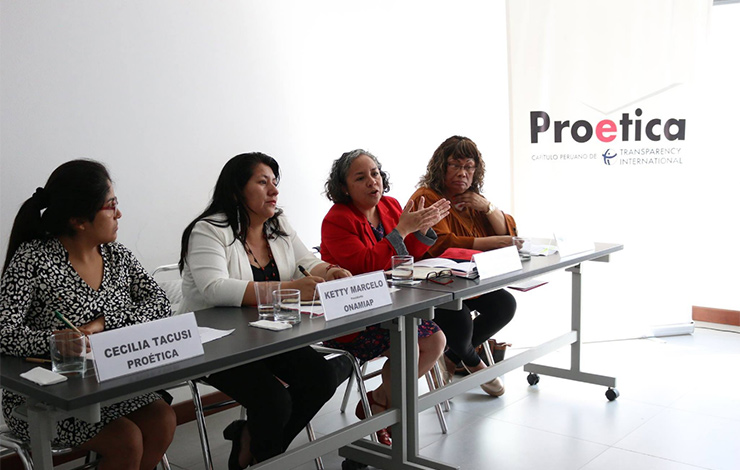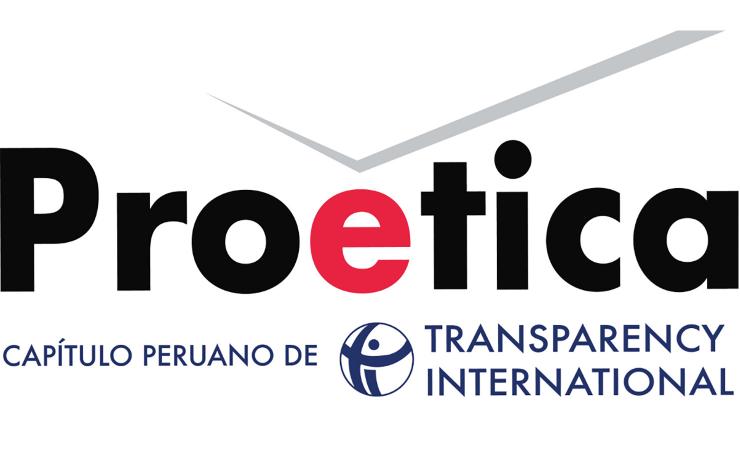This program developed transparency and ethics tools for a pilot sample of small and medium enterprises to improve their corporate governance and competitiveness. In addition to these tools, Proética organized anti-corruption trainings and forums for business leaders and public officials to discuss rule of law challenges.
Challenge

In recent years, Peru’s economy has been growing steadily. At the same time, however, the state has struggled to enforce rules and processes, creating conditions that enable corrupt practices. This problem is clearly reflected in the survey research on "Private Sector and Corruption" completed by Proética and IPAE between 2008 to 2011. The vast majority of entrepreneurs interviewed for the research agreed that the state fails to respond to the needs of their company and in some cases, excessive bureaucracy and complicated legal frameworks obstruct their work.
Despite government corruption and inefficiency, the medium and small enterprise (MSE) sector has been growing steadily. MSEs offer an opportunity to reduce poverty in Peru because they are easier to establish and they develop the creative capacity of small entrepreneurs and workers. MSEs are also a great source of employment and wealth generation. Formal and informal MSEs in Peru account for about 47% of GDP and are the largest generators of employment in the economy. Because of their positive influence on the economy, the state has undertaken an aggressive campaign to formalize MSEs by providing them with labor, tax, and administrative support. In doing so, the state is encouraging partnerships, promoting exports, and facilitating access to government procurement. Currently, 40% of state purchases are reserved for the MSEs. However, these reserved purchases are particularly susceptible to corruption because they are not conducted in an open manner and the relatively large amounts of resources they provide are inevitable source of temptation.
The nature and dynamics of the market in which the MSEs operate generate certain “areas of risk” where corruption may occur, ultimately affecting the development of free markets and free competition. The absence of basic tools for transparency, ethics, and good corporate governance further intensify the prevalence of corruption. It is therefore essential to promote good practices within the business sector to combat corruption and generate an environment that improves the competitiveness of enterprises.
Program Summary
The National Council for Public Ethics developed the project, Educating Social Entrepreneurs to Address the Rule of Law, with the goal of providing tools and mechanisms to promote ethical business practices within MSEs. This entailed training their employees and management to promote internal transparency, develop a code of ethics, and instill good corporate governance practices within their organizations, as well as their stakeholders’ organizations. This will ultimately improve organizations’ compliance with ethical standards and adherence to the rule of law, as well as add value to their organization.
Proética worked with the CIDELSA Corporation and its contractors to complete the three- step project. The first step of the project consisted of focus group discussions with CIDELSA employees and interviews with managers to identify the main corruption risks within the company and among their business partners, the findings of which were disseminated in a final report. The second stage of the project involved designing an employee training program based on these findings and developing a proposed Code of Ethics for CIDELSA. Once the training program was designed, CIDELSA employees and their partners participated in a series of six trainings. The third and final step of the project entailed preparing a final report, which provided pilot group members with the results of the initiative, best practices and changes identified in the pilot group. The report was shared with CIDELSA and disseminated among other peer MSEs.
Impact
The project was well received by CIDELSA and their partners. Six workshops were held and 148 employees were successfully trained. In addition, surveys given throughout the six workshops showed that over 87% of the trainees are interested in continuing to participate in activities related to strengthening leadership, professional ethics, teamwork, and corporate responsibility. The project interpreted this finding as an indicator of the project's sustainability and receptivity to carry out future initiatives. Overall, the project was successful in providing MSEs with basic anti-corruption tools, and Proética is hopeful that this will lead to more ethical business practices in Peru.
Partners
- CIDELSA Corporation


